Healthiest Baby Formula: Other Things to Consider
When you’re searching for the healthiest baby formula for your infant, it’s easy to fall into a ton of different rabbit holes. You’re going to hear about things like whey/casein ratio and A2 milk. Let’s look at some of the factors worth considering when you’re looking at the best formula brands.
Whey/Casein Ratio
In an attempt to mimic real breast milk, formula manufacturers engineer their products to have a specific whey/casein ratio. Not sure what whey and protein are? Here’s the deal:
- Whey proteins stay in liquid form in the stomach (when exposed to stomach acid)—think the watery whey that separates in a container of natural yogurt–and exit the stomach more quickly. Whey proteins are therefore easier to digest and are rarely a source of allergies.
- Casein proteins form solids in the stomach (like cheese curds) and empty at a slower rate. They are more likely to cause digestive issues and be a source of allergies.
There is controversy over the optimal whey/casein ratio for a baby formula because the ratios found in breast milk change over time. Whey content is high in early lactation (with a ratio of about 90:10), and by late lactation, whey and casein protein amounts are roughly equal.
Goat milk and cow milk both have a whey to casein ratio of about 20:80. Manufacturers add whey protein to their formulas to adjust this ratio.
So what is the optimal whey/casein ratio? This depends on factors such as how old your baby is (in other words, how developed his/her digestion is), whether your baby has any digestive issues (like reflux, which may be a reaction to too much casein), and whether your baby is sensitive or allergic to casein.
We also don’t really know how much of the whey and casein added to formula actually ends up being assimilated. It’s definitely worth having a conversation with your pediatrician about which formula has the right ratio for your baby, although in many instances the whey/casein ratio isn’t an issue you need to worry about. Most babies do fine on standard formulas.
Bottom line: Because human milk is so rich in whey, we prefer formulas that add it. The best formula brands almost always do.
Prebiotics & Probiotics
Probiotics are beneficial bacteria, and prebiotics are food for probiotics. You probably already know that good gut bacteria is key to healthy immune function.
Breast milk has natural prebiotic properties, such as its oligosaccharide content. The act of breastfeeding also introduces lots of healthy bacteria to the breastfed infant’s microbiome. In an attempt to mimic human milk (and ride the wave of current health trends!), many formula manufacturers now add prebiotics and probiotics to their products.
There’s little research to suggest that this offers any real benefits, and the American Association of Pediatrics doesn’t officially recommend it. Still, the addition of pre- and probiotics are almost certainly not harmful to healthy babies.
Bottom line: Even though many of the healthiest baby formula contains pre- or probiotics, I probably wouldn’t rely on this as an effective supplement (mostly because of dosage and quality/viability of the organisms). Parents who are interested in supplementing with probiotics should choose a high-quality product like this one from Bobbie.
Aluminum in Infant Formulas
Unfortunately, it seems like high aluminum content in formulas is pretty much ubiquitous (studies confirm this in UK and Canadian markets, and there is no research done yet on formulas in U.S. market).
It’s not clear exactly why this is, but there are a variety of modes of potential contamination: raw materials (powdered milk may have aluminum added to prevent clumpiness, for instance), additives (like phosphorous), and manufacturing processes.
It’s important to note that a lot of healthful foods we eat contain more aluminum than any of the formulas in this study–including fish, spinach, and many types of tea. I’m not convinced that the amount in formula is something worth worrying about.
We also don’t know is how much of the aluminum that’s ingested ends up accumulating in the body of infants and toddlers. In adults, most aluminum is excreted, but what remains does accumulate and can cause problems in the long term.
There’s little that consumers can do about aluminum in formula, except for:
- Choosing breastmilk if possible.
- Avoiding soy-based formulas, as these tend to be highest in aluminum.
- Preparing powder formula with a silicon-rich mineral water—in the U.S., Volvic and Fiji water fit the bill. Experts believe that this could reduce the absorption of aluminum across the gut of the child and also potentially help the child to excrete aluminum in the body via the urine. However, these are areas which are also being researched.
A2 Milk
You will see that some of the best formula brands in our lists above contain “A2 milk.”
Here’s the deal: Cow milk has two primary types of proteins–A1 and A2 beta-casein. More studies are needed, but there is some evidence to suggeste that A2 milk is easier to digest and less likely to cause inflammation than is A1 milk. The strongest evidence is around lactose intolerance–studies suggest that milk with A2 protein is much less likely to cause gastrointestional distress.
Among the healthiest baby formula brands, four contain A2 milk: Aussie Bubs, Baby’s Only, Serenity, and Holle. Also, goat milk contains that A2 protein, so this is part of the reason it may be more digestible.
Bottom line: We think A2 is probably better than A1 milk for babies, and some–but not all–of the best baby formula brands include it.
DHA/ARA
DHA and ARA are long chain fatty acids found naturally in human breast milk, which make up the major long chain fats in baby’s brain and nerve tissue.
We know that naturally occurring oils from food, food-based oils, and mom’s diet (in breast milk) is highly beneficial. However, it’s not clear that these benefits are enjoyed when DHA and ARA are added to formula. Still, most formulas now boast the addition of essential fatty acids DHA and ARA.
The most common types of DHA and ARA extracted by the solvent hexane, a known neurotoxin, although the hexane is removed from the formula after it’s been processed. There are other methods for extraction, but these are relatively new and the jury is out on whether they are harmful, beneficial, or of no consequence at all.
If you choose a formula without DHA added, but want to supplement on your own, this is the brand we like.
Note that all European formulas are now required to contain DHA, and that organic oils in European formula cannot be hexane-extracted.
Bottom line: We think there’s no downside to the addition of DHA/ARA in formula, and most of the best formula brands have choses to add it.
BPA in Formula Cans
Good news: there is one thing you no longer have to worry about when buying formula, and it’s BPA. The FDA has finally gotten with the program and banned BPA from formula container linings. Of course, I worry about what’s being used in place of BPA, but still this is a small victory!
Healthiest Baby Formula FAQs
What is the closest formula to breast milk?
Needless to say, I’m pro-breastfeeding. I have only two kids, but I breastfed for a total of 7 years, so you can do the math. But of course I also know amazing parents who formula feed their (very healthy!) children.
Every formula brand claims that their nutrient blend most closely mimics breast milk. Based on our research process, we think that ByHeart, Kabrita, and Nara get the closest.
What’s the best hypoallergenic baby formula?
Some babies, like those with milk protein allergies, need a hypoallergenic formula. Sometimes called “gentle,” these formulas contain hydrolyzed proteins, which means that they are broken down and more digestible.
Many pediatricians recommend Pregestimil or Nutramigen (both by Enfamil) or Alimentum (by Similac). If forced to choose between these, I would go for the Alimentum since it skips the carrageenan and corn syrup. But I can’t call any of these Good Stuff since all three contain ingredients of concern and none is organic. Nutramigen is probably the very worst of these, comprised of 48% corn syrup solids!!
If it were my baby, I would choose HiPP HA organic baby formula, which contains no sugar, corn syrup, or maltodextrin, and is full of good prebiotics. You also might want to try HiPP Anti-Reflux formula if your baby has a sensitive stomach. It’s made with 100% whey and no casein to prevent reflux.
If you want an American brand, Bobbie Organic Gentle is the only one that is sweetened with just lactose.
Please check with your pediatrician first if you suspect an intolerance or allergy.
Can you give an infant a “toddler” formula?
I know many parents who have chosen to feed their infants a “toddler” formula. Most toddler formulas contain the 29 key nutrients that are required by the FDA for infant formula. Some of these are the best formula brands out there but are not marketed as infant formula because the brands haven’t completed the infant feeding studies. A few notes on this country’s formula rules and regulations, by the way:
- The recipe requirements are from the Infant Formula Act of 1980 (which I believe is in desperate need of an update!).
- Infant formula certification requires multi-year and multi-million dollar feeding studies.
- Thus, there is a huge barrier to entry for innovative companies or smaller brands. ByHeart is one of the few brands who did their own study. (More on them in this post.)
- In early 2022, the FDA recalled brands (e.g., Similac, Alimentum and EleCare) after babies drinking these formulas became ill. This was nearly 6 months after the FDA found out but failed to act on the information. In March of 2022, the FDA finally shut down the facility producing these formulas, which lead to a formula shortage.
Again, ask your pediatrician to review the nutrition label on any formula you’re considering.
Where is American baby formula made?
Almost all infant formula sold in this country is produced by just four manufacturers:
- Mead Johnson (Enfamil)
- Abbott Nutrition (Similac)
- Nestlé (Gerber)
- Perrigo (Bobbie, Earth’s Best, generic formulas for many grocery chains)
ByHeart is made in the U.S. in its own factory, and Nara is made in Germany but FDA-approved.
Should you use filtered water for baby formula?
Yes! Tap water may be contaminated with chlorine byproducts, weed killers, insecticides, solvents, lead, BPA, phthalates, PFAS…the list goes on. Fluoride is present in infant formula, and when combined with fluoridated tap water, infant exposure levels can exceed safe amounts. I think everyone should invest in a good water filter, but especially if you have a formula-fed baby in your home.
What is the safest baby bottle?
Here is a cheat sheet to help you choose the safest bottle for your baby, whether you are breast- or formula-feeding!
Should I consider a goat milk formula?
Yes! Goat milk may be more similar to human milk because it contains A2 beta-casein protein. For an in-depth look at the pros and cons, check out our post about goat milk formulas.



































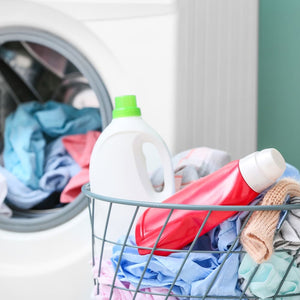
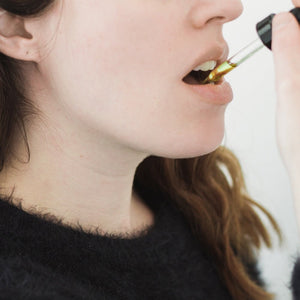
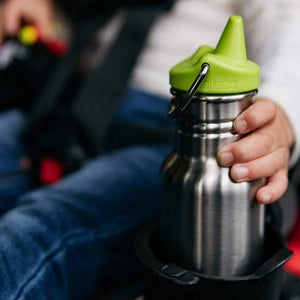
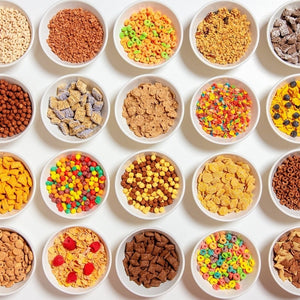
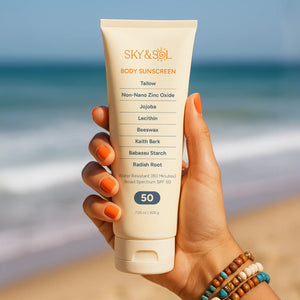

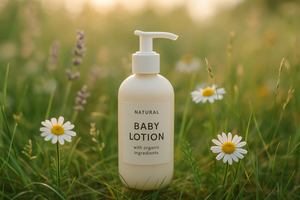
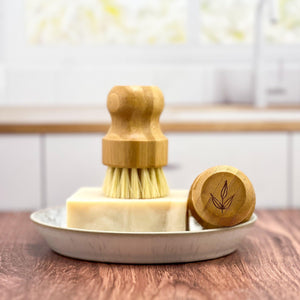
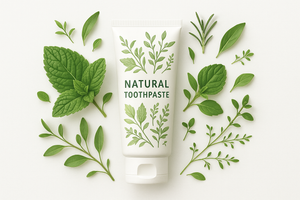
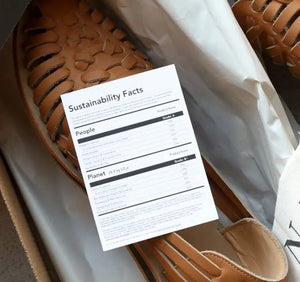
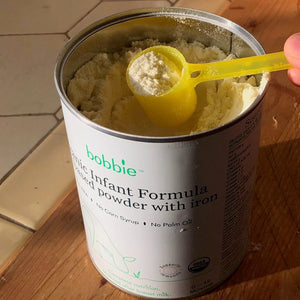
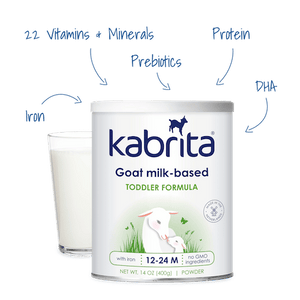

660 comments
Maia James
Thanks so much for sharing your story! Glad to hear that you finally found something that works for your son!
Maia James
Yes, Kendamil is definitely Good Stuff!
Maria M Aponte
I used Kabrita for my son starting at 2 1/2 months old and it constipated him to the point he couldn’t poop without enemas. If you are going for the Kabrita Toddler formula just go for the Babys Only Organic dairy/whey with DHA and ARA. My son is on that now at 11 months old and honestly I wish I had found it sooner. He always was constipated on Kabrita and Mt.Capra homemade goat milk formula but for some reason the switch to babys only Organic helped with the constipation relief.
MARIA A
My son is 11 months old now and was breastfed 2 months from birth. My supply diminished 2 1/2 months in due to high levels of stress and becoming pregnant again back to back. I started him on Kabrita toddler formula at 3 months old and he did horrible on it. He had Major constipation and pain for 2 months that was not worth it. I switched to the Mt.Capra homemade Infant goat milk formula which helped some what but still he remained severely constipated for months in that I had to start him on a strong garden of life probiotics as well. The pprobiotics worked great just the gas that comes before the big poop was painful for him. Finally these pass few weeks I gave up goat milk for him and switched him to Babys Only Organic Dairy and Whey with DHA ARA and let me tell you the major difference in bowl movements. His poop is softer and gas is less. He is doing great on it. I wish I knew about the Babys Only Dairy Whey with Dha and ARA before all this would have saved him the stomach stress.
Carolyn Wyrsch
Bobbie’s website says that they use water, not hexane, to extract their DHA. You mention above that they use hexane, but it is removed from the final product. I just wanted to get some clarification if you have any? I’m hoping they are not being deceiving in their marketing.